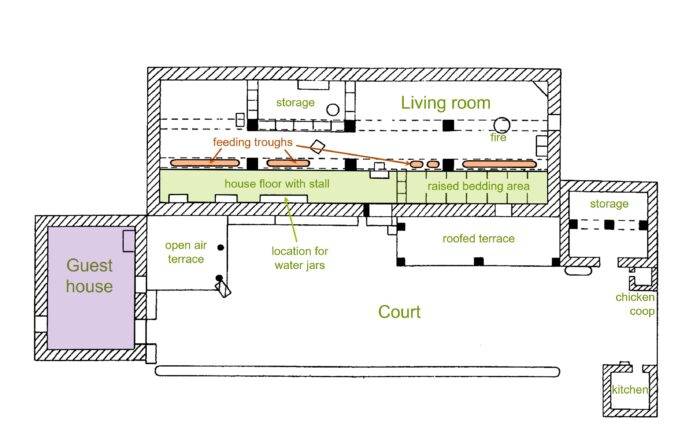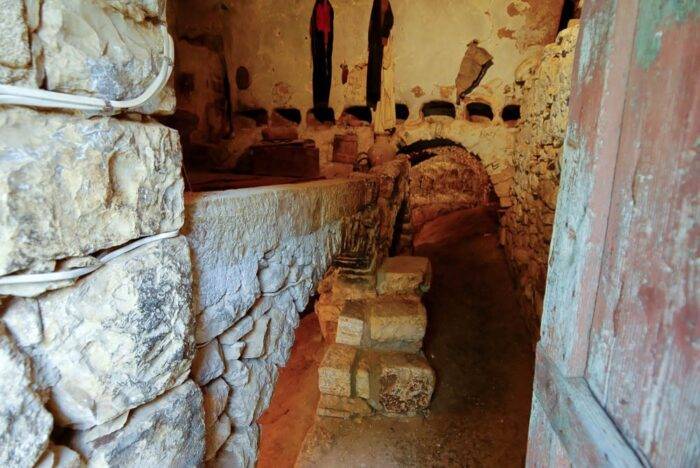The Nasty Innkeeper Who Turned Away Mary and Joseph—Did He Exist?
Everyone is familiar with him. He’s the nasty, mean innkeeper who turned away Mary and Joseph because the inn was full. The innkeeper is so famous, every Christmas many Christians draw lessons from his failure to provide accommodation for the Savior’s family. Indeed, some Christians allegorize the story by saying we all relate to the innkeeper because we often don’t make room for the Savior in our own hearts.
But what if the notion of an innkeeper in the traditional telling of the Christmas story is a little misleading? Okay, I actually think it is not just misleading but actually just wrong. I don’t think the evidence is there in the Christmas story for an innkeeper. Here is why I think that.

The Word Traditionally Understood as Inn, Likely Does not Mean Inn
In the KJV of Luke 2:7 we read, “And she brought forth her firstborn son, and wrapped him in swaddling clothes, and laid him in a manger; because there was no room for them in the inn.”
The word translated as “inn” in the KJV, is the Greek word kataluma (κατάλυμα). This word is only used three times in the New Testament. It is used here in Luke 2:7, and also in Luke 22:11 (cf. Mark 14:14) in reference to the guest room (the Upper Room) where Jesus and His disciples observed the Last Supper.
The Greek word kataluma is also used in the Greek Translation of the Old Testament (often called the Septuagint, or LXX) to refer to a general dwelling or place of lodging. For example, it is used in Exodus 4:24 in reference to where Moses was staying when the Lord sought to put him to death. It is also used in 1 Samuel 9:22 in reference to the dining room where Samuel and 30 others (including Saul) had a feast.
The simple point of the above observations is that this word seems to have more of a general reference to hospitality or lodging, not to a specific inn. The verbal form of this word, when used to refer to lodging, also seems to communicate simple hospitality or lodging (Luke 9:12; 19:7; cf. Gen 19:2; 24:23 LXX). So, it seems most likely that the word translated as “inn” by the KJV probably was not an inn.
There are Specific Words for Inn and Innkeeper that Luke Uses Later
A further component to this analysis is that Luke actually uses a specific word for inn and innkeeper later in his history. In the story of the Good Samaritan, while recording the words of Jesus, Luke writes that a Samaritan brings a wounded individual to a pandoxeion (πανδοχεῖον), a well known word for inn which is well attested in non-biblical Greek. Having mentioned the inn in Luke 10:34, Luke also records mention of an innkeeper in the next verse (Luke 10:35) with the word pandoxeus (πανδοχεύς).
Of course this seems to be significant evidence, because the author is the same in Luke 2:7 and 10:34-35. Luke has the same vocabulary to draw from, and specifically chooses to use a more generic term for dwelling in Luke 2:7 while choosing the specific word for inn in Luke 10:34. Although it remains possible that Luke 2:7 is referring to an inn (just in a generic way), it is in my opinion unlikely.
Preference for Family Rather than Public Lodging
I think it is a reasonable proposal that Mary and Joseph would have attempted to stay with family. In the ancient world, family was viewed as the most essential of relationships. Paul probably alludes to this when he says that one is “worse than an unbeliever” if he does not take care of his family (1 Tim 5:8). Apparently even unbelievers understood the need to take care of fellow family members.
Mary and Joseph were traveling to Bethlehem because the census mandated everyone go up to “his own town” (Luke 2:3), and Joseph was from Bethlehem (Luke 2:4). It is likely that Mary and Joseph arrived, well-worn from travel, and requested to stay with their family. The family lodgings looked something like this.

The guest room would have likely been elevated, with the habitat for animals on the ground floor (see following photo).

Although the city was no doubt busier than normal (it was the Christmas season after all), that the family could not make room for a pregnant mother nearing her delivery is strong evidence that the family rejected them. Mary and Joseph had, in the mind of the family, clearly engaged in fornication prior to being married. And for that reason, the family likely was displeased to have such unrepentant sinners staying in their guest house. It seems that the family did not allow their wayward family members to stay in the guest room (which would have been expected had Mary’s pregnancy been after marriage), but apparently did suffer them to stay with the animals. A humble and shameful beginning to the life of the Savior of the world!
Should We Say Goodbye to the Innkeeper?
As the above information indicates, I believe that we should bid farewell to the innkeeper. He probably did not exist. Mary and Joseph probably sought to stay with family, but because of the shame of being pregnant, they were likely relegated to the livestock area instead of the normal guest accommodations.
Although the majority of translations still use the term, “inn,” some of the more modern translations are making this change. Note the following translations:
| LSB | And she gave birth to her firstborn son; and she wrapped Him in cloths, and laid Him in a manger, because there was no place for them in the guest room. |
| CSB | Then she gave birth to her firstborn son, and she wrapped him tightly in cloth and laid him in a manger, because there was no guest room available for them. |
| NIV | and she gave birth to her firstborn, a son. She wrapped him in cloths and placed him in a manger, because there was no guest room available for them. |
Does this mean that any time there is a childhood nativity drama that we should stand up in the back and shout down the poor child that plays the innkeeper? Obviously not. In many ways, it is similar to the idea that Joseph had a multi-colored tunic. The point is that we can be patient and kind on issues like this. I think it would be wise “not to quarrel about words, which does no good, but only ruins the hearers” (2 Tim 2:14). Instead, we can focus on the fact that our Savior did come to earth in humble and shameful circumstances. He suffered that for our sakes! And if we have opportunities to lovingly help people understand the Christmas story with a little more accuracy, praise the Lord!
Christmas Questions with Dr. Will Varner
For a brief discussion of this issue and other Christmas details, see the following interview I had with Dr. Will Varner.
First Photo by KEEM IBARRA on Unsplash
2 Comments
Alex Krause
Shouldn’t you indicate a bit better that you are joking? The anachronism: (it was the Christmas season after all) needs explanation.
Peter Goeman
I like to keep the audience guessing whether it’s a joke or not :)